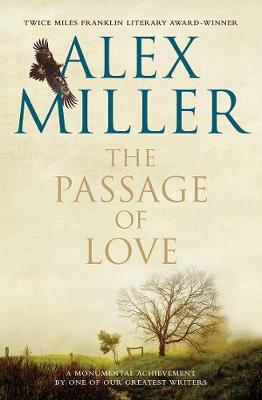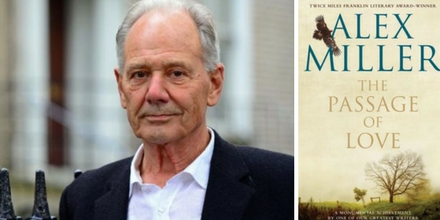Alex Miller is the highly acclaimed author of over twelve books. He is a twice winner of Australia’s premier literary prize, the Miles Franklin Literary Award, first in 1993 for The Ancestor Game and again in 2003 for Journey to the Stone Country. Along with his Miles Franklin wins, Alex’s books have won many other literary awards, including the 2014 Victorian Premier’s Literary Award for Coal Creek.
Alex’s latest novel, The Passage of Love is out today. Sitting in a New York park, an old man holds a book and tries to accept that his contribution to the future is over. Instead, he remembers a youthful yearning for open horizons, for Australia, a yearning he now knows inspired his life as a writer. Instinctively he picks up his pen and starts at the beginning… The Passage of Love is a rich blend of thoughtful and beautifully observed writing, where the lives of a husband and wife are laid bare in their passionate struggle to engage with their individual creativity. Alex Miller is magnificent in this most personal of all novels filled with rare wisdom and incisive observation. Now, Alex Miller answers some questions about his writing.
 1. Alex, you said you perhaps wouldn’t write another novel and this year we expected your autobiography. Can you explain this change?
1. Alex, you said you perhaps wouldn’t write another novel and this year we expected your autobiography. Can you explain this change?
When I came to deal with the material of The Passage of Love I changed my mind. What you have in The Passage of Love is what Virginia Woolf called, autobiographical fiction. I stayed with the idea of an autobiographical account of my struggle years and my first marriage, but reverted to the genre I love best, the novel. Certain events in The Passage of Love – for example, the publication date of my first novel – are shifted from their actual historical moment to better suit the narrative of the story. In other words, I fictionalised the material. It’s all true, but not quite in its historical order. I once said, I don’t so much make things up when I write, as re-arrange facts in the service of story. This is not a new thing. Virginia Woolf famously did it in To the Lighthouse and V. S. Naipaul in The Enigma of Arrival. Many people would say Drusilla Modjeska did it brilliantly in Poppy. Autobiographical fiction is common among serious writers.
2. Your character Robert moves around the Eastern Coast, Queensland and Victoria in particular. What part of Australia is your favourite?
I worked in Queensland as a young man and still have many dear friends there who are connected to those days, the early fifties. The Central Highlands of Queensland and the Bowen Basin hinterland remain for me places of great beauty for which I retain a deep emotional attachment. The Urannah Valley, in Journey to the Stone Country, Ranna, for example, is one of the least spoilt places in the world. The water of the Urannah Creek is pure, one can bend and drink from it. There is an abundance of fish and turtle, indeed wild life abounds. I visit Queensland frequently with Aboriginal friends who belong to that country. These places and the friendships associated with them have enriched my life.
Victoria is where I have lived since the early sixties, when I entered Melbourne University. Victoria is where I met my first wife, Anne Neil, Lena in The Passage of Love. Victoria is where my mature struggle to become a writer took place. It is where I met and married Stephanie Pullin, my wife now for forty three years and the mother of our children, Ross and Kate, who both grew up in Port Melbourne. Stephanie grew up in Mansfield and until the death of her mother and father we visited Mansfield regularly and enjoyed holidays and family Christmases there. For forty years Stephanie and I have explored the Victorian deserts and forests, camping and walking, drawing and photographing and watching our children fall in love with these places, places they still love as adults and which they regularly visit. Our move away from Melbourne to the town of Castlemaine seventeen years ago was a return to the country for Stephanie and me. We both love the hard-grown dry forest country here and walk in it every day.
3. Give us one inspiration to say to someone whose greatest desire is to become a writer.
Never doubt that what you have to say has worth for others. This faith will help to keep you strong when you meet with early resistance to what you write from the publishing industry and critics. Your love of writing is the most important thing, it is this, in the end, that will give you a place among writers. Fellow writers are your friends. They know what you are doing and understand it as no one else does. Read them.
4. And now finally for all booklovers, could you recommend three books by other authors that are memorable to you?
Poppy by Drusilla Modjeska (Penguin, 1990); Walks With Walser by Carl Seelig (New Directions, 2017): Memoirs of Hadrian by Marguerite Yourcenar (Farrar, Straus and Giroux paperback, 2005).

The Passage of Love
Sitting in a New York park, an old man holds a book and tries to accept that his contribution to the future is over.
Instead, he remembers a youthful yearning for open horizons, for Australia, a yearning he now knows inspired his life as a writer. Instinctively he picks up his pen and starts at the beginning...
At twenty-one years, Robert Crofts leaves his broken dreams in Far North Queensland, finally stopping in Melbourne almost destitute. It's there he begins to understand how books and writing might be the saving of him. They will be how he leaves his mark on the world. He also begins to understand how many obstacles there will be to thwart his ambition...
About the Contributor
Tanaya Lowden
Tanaya has been a lover of books for as long as she can remember. Now, her book collection is a little out of control, mostly consisting of YA fiction and pretty hardcovers. When she’s not reading, she spends a lot of her time taking photos of books for her bookstagram account, @prettypagesblog. She also has a love of Disneyland, bullet journaling and cats.
Follow Tanaya: Twitter






 Alex Miller returns with his most personal of novels.
Alex Miller returns with his most personal of novels.
Comments
October 28, 2017 at 10:54 pm
As the photographer of the image in the front cover, I was delighted to recently receive an advanced copy of The Passage of Love by Alex Miller.
On the surface, The Passage of Love is Alex Miller’s autobiography masterfully woven into fiction in the life and enigmatic relationship of Robert Crofts an aspiring writer, and Lena Soren, a middle class Melbourne girl seeking to break free from the bondage of her disciplined upbringing. However, the novel represents a much deeper theme of “central contradictions” that exist not just in the couple’s relationship, but perhaps in many of us.
Alex contrasts the contradictions and ironies of having freedom but no sense of belonging and purpose. For some freedom is sought through bondage. For many, the novel will represent the desire to escape from our very existence and the poignant search for purpose and meaning, but not possessing “the courage of one’s dreams”, because we are too afraid to step out, perhaps not really wanting to discover what lies beyond the horizon? For some, it may be about a burning passion without a clear purpose and direction, so one never really finds what he or she is seeking. Then, there are the ironies of things that one seeks to escape but others so desire. And the “presence of absence”, where introverts are liberated in silence, and the extroverts who need desperately to be liberated from silence. There will be some who may not want to be looked at, but want their deepest sorrows to be seen.
These themes are contrasted in the photograph of the book cover which I took one misty winter morning of 2015 in the Kangaroo Valley of New South Wales. The contrast of the naked elm tree that on the one hand could look dead but is wanting to burst into leaf at the first sign of spring. Or the young and frail elm tree subtly leaning in the opposite direction seeking her own direction, the two trees figuratively separated by a dividing fence in their own pursuits. Or the beautiful and lush green paddocks, contrasted with the melancholy of the lifting morning fog that slowly unclothes the mystery of each of the novel’s complex and sometimes enigmatic characters. And, the paradox of the image of the wedge tail eagle, which like all eagles in majestic flight symbolise for us freedom, yet are fiercely loyal to their mating partners and highly territorial, returning each year to breed in the same nest.
Alex masterfully unfolds the complex interconnection of these contrasting and contradicting themes that could otherwise be easily missed if The Passage of Love was read without some self-reflection.